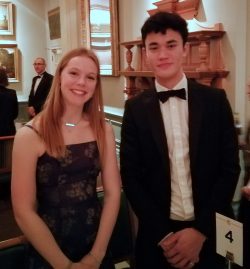December 22, 2024
Varsity Match Day 1 Report
Posted on March 3, 2019 | in Giraffe, Match Report, NewsTicker | by Christie FixturesFriday would see the Women’s Singles and Men’s Doubles matches at the beautiful tennis court behind the pavilion at Lord’s Cricket Ground. First up was Elle Curzon-Green (Cambridge) against Lottie Hoskin (Oxford) in the 4th seed match. Both players started out well, exchanging a few games each. Curzon-Green figured out Hoskin’s weakness in her backhand corner, and fired several lovely shots there low over the net from any loose serves that she was given, racing up to a 4-2 lead. But Hoskin served well, getting the ball to spin and bite into Curzon-Green, levelling up the match 4-all, with the help of a few racket errors. Curzon-Green stayed calm and fired in two short chases on Hoskin’s backhand for a useful lead. Hoskin tried hard to equalise, getting a surprise chase after Curzon-Green charged up the court to swing and miss everything. Curzon-Green remained calm, hit two beautiful cross-court return of serves to win the chases and took the first set to Cambridge with a failed backhand volley from Hoskin.
The second set would be very close, with Curzon-Green benefiting from loud cheering from the CURTC Ladies Morning girls in the dedans. Once again, she found herself up with a 4-2 lead, but then started to overhit her serve under the pressure. Hoskin took advantage to bring it back to 4-all again. After a lobbed shot to the dedans, Hoskin found herself 4-5 down, and played some of the best tennis of the match so far; with Curzon-Green unable to get shots from the grille corner, Hoskin took the initiative and the set 6-5.
The third set was all to play for. Curzon-Green took an early lead, helped by an untimely double fault and some good cross court shots. The rallies were getting long, neither girl wanted to lose. Hoskin fought back well; the two of them locked together at 2-all, 3-all and 4-all. Both of them were having to work hard for every point. The earlier chatter in the dedans had transformed to nervous silence. Hoskin ran through the ninth game for a crucial 5-4 lead, Curzon-Green buckled down, chased after everything and got herself to good chases low into the corners, which put the set at 5-5, final game. Hoskin started with a good serve that cramped Curzon-Green, but then made a couple of racket errors that gave Curzon-Green two match points. Hoskin fired the first one at the grille, and Curzon-Green couldn’t get it back. But on the next point, it looked all over when Curzon-Green hit hard and low into Hoskin’s backhand corner. Desparate, she threw everything she had at it, which was just enough to roll the ball up onto the penthouse, over the net, and down for a hazard chase. Curzon-Green, shocked, missed what could have been a winning shot. Hoskin stayed calm at the hazard end, eventually getting a short enough chase to steal the match for Oxford.
—
Sophia Lewis (Cambridge) was out for revenge in the Women’s 3rd seed match against Lucinda Maxwell (Oxford). Both girls had a nervous start on the serve; Lewis with a side-wall serve and Maxwell with a lawn tennis serve. The match started going back and forth between them, both playing well at the service end. Maxwell was able to find and hit her targets, whereas Lewis placed heavy cut on the ball to trouble Maxwell off the back wall. After Maxwell won the fifth game with five deuces thanks to an untimely double fault. Maxwell tried some underarm twist serves, but Lewis was able to put them away into the corners with ease. But at 3-4 down, something clicked for Lewis. She started moving her feet well, winning a lot of short chases and raced through the rest of the set to win 6-4. Lewis continued well into the second set. She was moving her feet well and was able to cover most of Maxwell’s shots. Though she dropped the first game of the second set, Lewis won the next six without looking troubled. Her backhand volleys all seemed to find the tambour, and she wasn’t troubled by Maxwell’s serve. Cambridge had levelled up the match.
It was now the turn of the guys, with the second seed doubles match. Jimmy Campbell and Ivo Macdonald (Cambridge) faced off against Charlie Defries and James Bates (Oxford). Cambridge played with Macdonald at the net for every point, with Campbell covering the back of the court, whereas the Oxford pair shared the load equally. The first set saw Campbell serving tight demi-piques to Defries, who responded with his idiosyncratic railroads. Macdonald was showing off his rackets serves, and Bates was showing he could spin it both ways from the serve. Cambridge raced to a 3-0, 40-15 lead, with Campbell covering well and directing Macdonald around the court via loud shouting. A couple of times, he took a shot from the penthouse that Macdonald was lining up to take. Finally, Oxford won a chase, and Campbell started to put some into the net, letting Oxford back into the game, bringing it to 4-all. A cruicial point followed in the next game, where a bewildered Campbell looked to leave a hazard chase, but the marker called a stroke, giving the game to Oxford, who would go on to take the set 6-4.
The second set began with the same receivers. Oxford had the momentum and kept pushing on with it. Campbell was getting frustrated, with a lot finding the net. Macdonald was doing well at the net, but Defries and Bates were too strong. Both started hitting the ball a lot harder, and were finding their targets. They won six games on the trot to take the set 6-1. Cambridge had to roll the dice, so opted to switch receivers; Macdonald now taking on Defries’ railroads. Slowly, the momentum in the match began to shift. Campbell started to work on Defries, illiciting enough errors on the volley through good ball placement. By the end of the set, Cambridge were volleying really well, and wrapped it up quickly, from 4-2 to 6-3 in rapid time.
However, cruicially, the Cambridge pair found themselves at the service end at the end of the set, meaning that Oxford were able to return to the original receiving pairings for the start of the fourth set. There was a lot of excellent long rallies along the main wall, with Campbell trying as hard as he could to break through Defries’ defences. However, Campbell was serving a little looser, and Defries was able to get enough on the force to get a few dedans as well. Defries was strong enough to work to a 4-1 lead. Feeling the match slip away from him, Campbell was tiring. He kept trying to push Defries and Bates on the tambour, but lost a chance to bring it to 3-4 as a lucky bounce had the ball jammed right on the side wall. Oxford now had a 5-2 lead. Some great net volleys from Macdonald brought it back to 4-5, but a Campbell shot which just missed the winning gallery was punished for a short chase. Macdonald couldn’t get enough cut on the ball to beat it, letting Oxford win the set 6-4, taking an early and cruicial lead in the men’s Varsity.
—
The women were back on court again, with captain Alexandra Baranowski (Cambridge) against Natalie Barber (Oxford). On paper, Barber was 17 handicap points better, meaning Baranowski was a heavy underdog. Baranowski was predominantely serving either a high bobble or a low high-drop serve, whereas Barber mixed and matched. At first, Barber was struggling with her first serve, but her second was strong enough to make Baranowski work hard. However, Baranowski couldn’t seem to trouble Barber, who kept calm and placed the ball at will. Barber kept the ball low to the ground, winning several points from unsuccessful half volleys near Baranowski’s ankles. Towards the end of the match, she started to figure out how to deal with Barber’s poorer serves, but there were enough good serves that it couldn’t make a difference. Baranowski got her best chance at the end of the first set, as Barber clipped the wall around the grille twice, and had a ball come out of the winning gallery for a hazard chase. However, Baranowski could only win one game on the way to a 6-1 6-0 victory to Oxford.
The first seed match was even more one-sided. Oxford captain Georgie Willis was leagues above Cambridge’s Olivia Chesser. Everything about her game was sheer class. Chesser could only manage underhand volley return of serves, which sat up for Willis to destroy. She alternated her shots; one winner under the grille, another under the winning gallery. Chesser got a couple of good hard forces in, Willis wouldn’t let any game go to deuce, finishing the game quickly with a very comfortable 6-0 6-0 victory for Oxford.
—
The last match of the day was the men’s first seed doubles. It saw Ed Hyde and Jack Drew for Cambridge against Rory Giddins and Harry Lawes for Oxford. The Oxford pair operated a fairly conventional doubles strategy, with Lawes at the net every game at the service end. But Cambridge hatched a unique strategy. At the hazard end, Drew played up defending the winning gallery, while Hyde played both the tambour and the back of the court as though it were singles. The first set saw Hyde serving to Giddins. The first game saw one of the highlight rallies of the match, as Drew scampered backwards, hitting the ball behind his back, the rally continuing until Hyde clobbered it into the net. Hyde was able to pick off Lawes at the net from Giddin’s giraffe serves well, who was mishitting more volleys than he was making. Hyde was scampering around the court well, taking Cambridge to a good 5-2 lead. But Lawes started to settle and pick off more volleys, meaning Cambridge lost their reliable strategy. The remainder of the set saw some long rallies between Hyde and Giddins. A combination of bad luck and good shots from Giddins led to an Oxford comeback, eventually taking the set off Cambridge with an excellent Giddins return of serve.
In the second set, the Oxford pair targeted Drew a little, giving away a few key points on the volley. The Cambridge strategy of playing like it was singles was starting to stretch, with Hyde scraping for many shots. The shining hope for Cambridge was Drew’s return of serve, because although some were wayward, there were enough main wall dedans or cut balls into the corner to keep it competitive. Lawes volleyed well, and Oxford took four games in a row to take the set 6-2. Cambridge needed to change things up, so changed the receivers going into the third set. Drew held his own against Giddins’ giraffe serves, but Hyde was still taking most of the action. Giddins remainded solid, finding cracks in Hyde’s defenses. Hyde was clearly showing signs of tiredness, with Oxford racing ahead to 5-1. The Cambridge pair pushed two tight games to deuce utilising the base of the tambour effectively. They were even up 40-15 in the following games, though they mishit key shots to cede the match to Oxford 6-3.
FIRST DAY RESULTS
Elle Curzon-Green lt Lottie Hoskin 6/4 5/6 5/6
Sophia Lewis def Lucinda Maxwell 6/4 6/1
Jimmy Campbell and Ivo Macdonald lt Charlie Defries and James Bates 4/6 1/6 6/3 4/6
Alexandra Baranowski lt Natalie Barber 1/6 0/6
Olivia Chesser lt Georgie Willis 0/6 0/6
Oxford Ladies lead 3-1
Oxford Men lead 2-0
Ben Geytenbeek
photos Vix Harvey









Leave a Reply